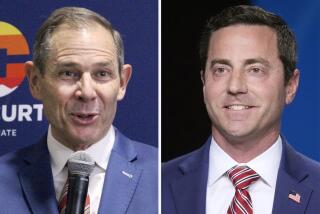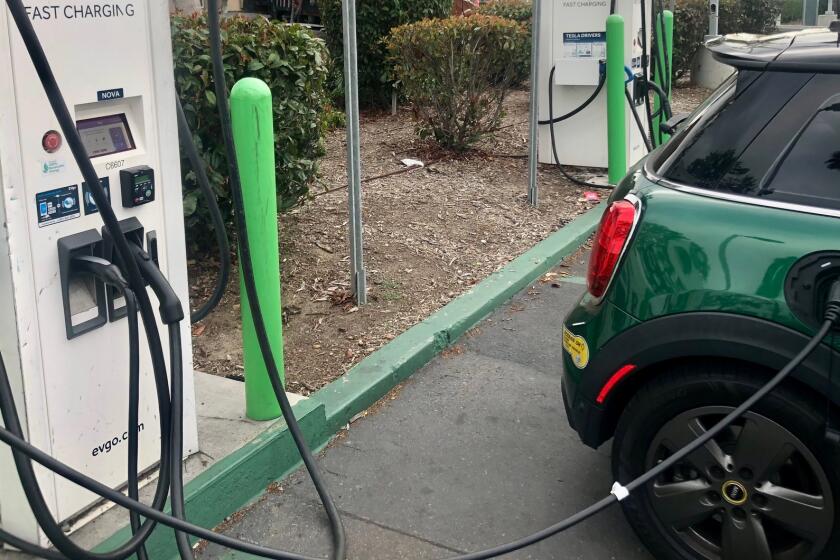And the GOP front-runner is ...
The race for the 2012 Republican presidential nomination starts in earnest this week at the annual Conservative Political Action Conference in Washington.
Too early, you say? On the contrary. With the Iowa caucuses and the New Hampshire primary only 12 months away, it may soon be too late for anyone who wants to run for president to begin the hard work of raising money, recruiting a staff and wooing Republican activists.
So let’s get started. Here’s the conventional wisdom, fresh from the corridors of power, on the state of the Republican race:
There are really only two spots on the GOP ballot. One is reserved for Mitt Romney, the former Massachusetts governor who won nine primaries in 2008. The other is for someone who isn’t Mitt Romney — someone like Sarah Palin, Mike Huckabee or Tim Pawlenty.
Romney has been running for the nomination the old-fashioned way. He has raised more money than any other hopeful ($6.3 million for his political action committee during the last two years). He spent most of last year collecting IOUs as he helped Republican candidates across the country win House and Senate seats. He’s the solid front-runner in polls in New Hampshire, the first primary election state.
If the Republican Party worked the way it used to, Romney already would be the presumptive nominee. For decades, Republican governors and state party chairs coalesced early around a tested, experienced candidate — George H. W. Bush in 1988, Bob Dole in 1996, George W. Bush in 2000 — and helped him fight off insurgent challengers.
But the party doesn’t work that way anymore. Internet politics have arrived in Des Moines as well as Cairo. Insurgent movements such as the “tea party” can catch fire no matter what party elders think. And even though Romney is essentially a Reaganite, plenty of conservatives find him hard to love. He gave Massachusetts a state-regulated health insurance plan that looks suspiciously like “Obamacare.” He supported, and still supports, the 2008 bailout of the banking system. Both of those big-government initiatives worked out pretty well — but both are anathema to the tea party.
That leaves an opportunity for someone else — someone who can excite the fiscal conservatives of the tea party and the social conservatives who populate the GOP’s Iowa caucuses.
It could be Palin, the former governor of Alaska; she causes tea party hearts to race. But GOP strategists and many grass-roots activists don’t think she’s likely to run, which explains why the list of potential candidates for the not-Romney spot is so long. It’s led by Huckabee, the former Arkansas governor who won the Iowa caucuses in 2008 but hasn’t decided whether to try again, and Pawlenty, the former Minnesota governor who has been campaigning actively in Iowa.
On paper, Pawlenty could be a formidable challenger to Romney from the right. He’s a fiscal conservative who cut his state’s budget but remained popular among voters. He’s a social conservative who has proposed restoring the military’s “don’t ask, don’t tell” ban on acknowledged homosexuals. But on television and in person, Pawlenty has been colorless and charisma-free — so far.
That’s where this week’s CPAC conference and other early “beauty contests” come in. They’re an opportunity for little-known figures like Pawlenty to get some exposure.
Who else will be there? Former House Speaker Newt Gingrich, Indiana Gov. Mitch Daniels, Mississippi Gov. Haley Barbour, former Utah Gov. Jon Huntsman, former Sen. Rick Santorum of Pennsylvania, libertarian hero Rep. Ron Paul of Texas, tea party heroine Rep. Michele Bachmann of Minnesota, Sen. John Thune of South Dakota and others too obscure to mention. (Palin and Huckabee aren’t coming.)
On Saturday, CPAC will hold a straw poll of its delegates, and that will get headlines. But it’s not important, and it won’t predict the winner of the nomination. (Romney won the straw poll four years ago; Ron Paul won last year.) More important is what the potential candidates say and whether any of them lights a spark — or commits a blunder.
In polling so far, Republican voters have consistently listed four potential candidates as their top choices, in slightly varying orders: Romney, Palin, Huckabee and Gingrich. But that’s no prediction of where things will end up either. The same question four years ago yielded a clear front-runner for the 2008 nomination, former New York Mayor Rudy Giuliani, and he didn’t win anywhere.
Still, those polls do reveal one interesting factor: Of the four best-known candidates, Romney and Huckabee appear acceptable to almost all Republicans — but Palin and Gingrich both gather relatively high “unfavorable” ratings, meaning they’d face a tougher sales job.
And a CNN poll last month found a measure of electoral pragmatism among Republican voters, despite the ideological fervor of the tea party movement. More than two-thirds of Republican voters nationwide said they wanted, most of all, a nominee who could beat President Obama; fewer than a third said they would insist on a candidate who agreed with them on the issues.
Obama and his strategists are already worried about the nation’s sluggish economy and the uphill battle they face if unemployment stays high. If the dogged activists of CPAC and the tea party commit themselves to working for any Republican nominee, that should worry them too. If Republicans can harness tea party fervor to a well-run national campaign, whether the vehicle is Romney or Pawlenty or anyone else, Obama could face the fight of his life.
More to Read
A cure for the common opinion
Get thought-provoking perspectives with our weekly newsletter.
You may occasionally receive promotional content from the Los Angeles Times.











